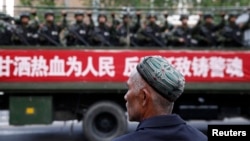Chinese state media say the country’s remote and restive region of Xinjiang has set aside nearly $50 million in rewards for those who help provide authorities with leads in their crackdown on violent extremists.
The announcement of the massive reward scheme comes just days after Xinjiang saw its most violent week of unrest since 2009. Last week, nearly 100 people were killed in violence the government says was carried out by a gang of violent ethnic Uighur terrorists.
The Chinese government did not disclose the deaths for days, prompting overseas Uighur groups to question the government’s version of the events and call for an independent investigation.
State media say the unrest in southern Xinjiang began early Monday morning on July 28 in Yarkand County, a district outside the city of Kashgar. It was not until nearly a week later, however, that Chinese authorities released a more detailed account of what had happened.
Police stations, governments buildings attacked
According to state media, masked men carrying knives and axes attacked police stations and government offices in the township of Elixku before turning their attention to civilians, smashing and torching dozens of vehicles.
According to a report Sunday on Tianshan, an online news site run by the Xinjiang regional government, 37 civilians were killed during the attacks, including two Uighur officials. Police shot dead 59 alleged terrorists and 215 others were taken into custody.
Like much of China’s reporting on terrorist attacks, it was not possible to independently confirm many details of the violent unrest. Chinese state media say a man police named as Nuramat Sawut was the instigator of the attack. Sawut reportedly had prepared groups to participate in the attack by meeting with them during the holy month of Ramadan.
'Holy war'
State media reports say those who participated were carrying flags declaring a “holy war” and that Sawut was working together with the East Turkestan Islamic Movement.
The attack in Yarkand came just days after what state media says was a massive manhunt south of the area just outside the city of Hotan. According to official accounts some 30,000 people helped authorities encircle a group of 10 terrorists, nine of whom were killed at the scene.
Footage of the manhunt on state media showed individuals marching through cornfields and lining streets with clubs. On Saturday, the Xinjiang Daily said officials handed out nearly $600,000 in rewards to those who aided authorities in the effort.
In addition to the violence in Yarkand or Shache, as it called in Mandarin, the 74-year old imam of the Id Kah Mosque in Kashgar was killed last week in what appeared to be a targeted attack.
Cracking down on terrorism
Chinese analysts say last week’s violence highlights the growing intensity of the government’s campaign to crack down on terrorism and that they are watching to see if the attack will mark a turning point.
Over the weekend, the party secretary in Xinjiang, Zhang Chunxian, pledged to “unswervingly” press forward with the campaign, to strike extremists hard and with accuracy, to remove as he put it "the weeds of separatism" by digging deep to their roots.
The overall prevalence of deep religious extremism in Xinjiang remains a matter of debate in China. Most people in the remote region practice a more moderate form of Sunni Islam. But some Chinese analysts warn that the government’s tough tactics could backfire by radicalizing more moderate Muslims.
Dilxat Raxit, a spokesman for the World Uyghur Congress says the government is living under an illusion if it thinks that cracking down hard in Xinjiang or offering rewards will win it the support of the Uighur people.
“The main sticking point here is changing the government’s current policies. If it doesn’t do that, these types of conflicts could arise at any moment,” he says.
Since Chinese President Xi Jinping took office last year in March, the death toll from ethnic violence in Xinjiang and other parts of the country has risen to nearly 300. Hundreds of ethnic Uighurs have been taken into custody and more than a dozen have already been executed for “violent terrorism” crimes.












